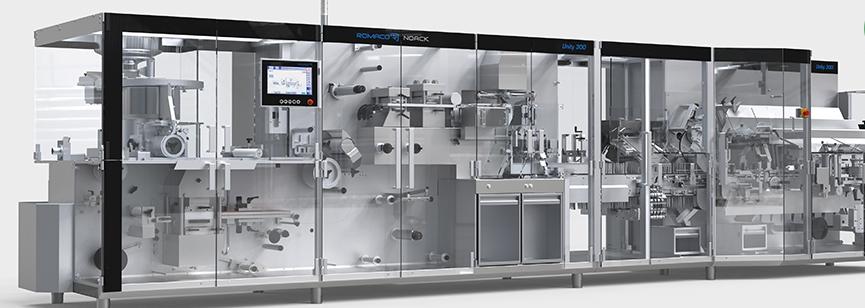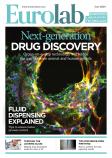
Romaco Noack’s compact Unity 300 blister packaging line meets all the requirements for sustainable pharmaceutical production. Numerous design features ensure energy efficient packaging processes and reduce the carbon footprint left by users of this innovative technology.
Romaco Noack will take advantage of this year’s Taropak to show its latest climate-neutral blister packaging line for use in the pharmaceutical industry. The Unity 300 is specially designed for the low to medium speed segment and was developed strictly according to the principle “avoidance is better than reduction is better than compensation”. Romaco sees this technology as an enabler for more sustainable production on the part of its customers. That is why, for the first time, the single-track blister line has been equipped with an intelligent sustainability monitor that keeps a continuous watch on the machine’s power and air consumption. Smart standby functions allow a significant reduction in the line’s base load during downtimes without any negative effects on OEE (overall equipment effectiveness).
Energy efficient system design
At less than 8m long, the Unity 300 has an exceptionally space-saving layout and a correspondingly lower carbon footprint. This is particularly true of the cleanroom for the primary packaging unit, where carbon dioxide emissions can be reduced in a targeted way by minimising the space needed. Amongst other things, the blister line’s compact design is due to the swing-out IPC magazine, which ensures convenient access to the punch behind it. As another example, the forming foil reel can be optionally repositioned inside the machine. The monobloc achieves a maximum output of 300 blisters and, depending on the cartoner, either 200 or 300 cartons per minute. With its wide format range, the new solution is suited for all kinds of applications, which is a key requirement in the contract packaging sector.
The integrated blister transfer from the rotary sealing machine to the continuous motion cartoner is effected by an energy efficient indexing wheel, which removes the punched blisters vertically and feeds them directly to the cartoner. The suction cups of the carousel-shaped shuttle are only ever active while blisters are being transferred. Furthermore, the use of a machine housing made from 100% recycled Plexiglas impacts positively on the carbon footprint of the blister line. The Unity 300 is additionally available in a carbon-neutral version on request. All in all, 68 tons of carbon equivalents are emitted during the production of the line, and these can be offset by purchasing a Gold Standard climate certificate.






